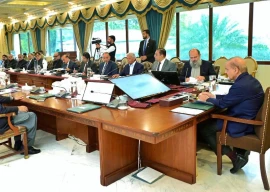
Last September, dozens of leading Pakistani politicians met in Islamabad for nine hours at an All Parties Conference on national security. There, they resolved to “give peace a chance” and pursue a negotiated settlement to the wars in both Afghanistan and Pakistan. A year later, one must ask whether it is worth giving peace a chance — whether the Taliban on both sides are indeed ready for peace.
In Afghanistan, the war rages on. Exploratory peace talks between the US and the Taliban have stalled. The Taliban fight-talk strategy involves mainly fighting and little talking. But Mullah Omar, in a recent Eid statement, continues to speak of Afghan unity and states that the Taliban “does not think of monopolising power”. The group, in its public statements, continues to describe itself as interested in evicting a foreign presence and sharing power with other factions inside Afghanistan. Putting the veracity of these statements aside, the fact that they are being said is significant. It clearly contrasts with the Taliban on the Pakistani side of the border.
The Tehreek-e-Taliban Pakistan (TTP) continues its war against the Pakistani state while its ally, Lashkar-e-Jhangvi, proceeds with a campaign to murder Shia Muslims, especially in Gilgit-Baltistan and the greater Quetta area. The TTP, taking advantage of safe havens in Afghanistan, resurge in Bajaur and are letting the world know this with its own particular form of depravity.
A recent TTP video depicts Taliban fighters standing before 12 severed heads, all of kidnapped Pakistani soldiers. The visuals look unreal, as if the heads are merely props from a movie set laid out on grass. But the ugly reality becomes clear as the TTP fighters show photos of the slain army men in uniform. There is something distinct about the depravity of the TTP.
The Taliban in Afghanistan are not some simple group of benign ‘freedom fighters’. Recently, in Kandahar, two Taliban commanders executed 17 civilians for spying for the United States, merely a cover for their killing of a woman among them whom they fought over. These acts most likely point towards growing insubordination in the Afghan Taliban ranks as Mullah Omar has called for avoidance of civilian casualties. But they do point towards militancy as an inherently destabilising phenomenon — one that consumes populations on both sides of the Durand Line.
It has and must be asked again of politicians like Imran Khan, how he plans to make peace with the TTP when it does not seek peace with him. Tactical truces with Hafiz Gul Bahadur and Maulvi Nazir might allow the Pakistan Army to focus its efforts on the TTP. But none of the madmen in North Waziristan — including the Haqqanis — have any sense of fealty to the Pakistani state. The TTP and a host of other jihadist splinter groups hide in their midst and plot attacks nationwide. What the TTP seeks is not merely an end to Pakistan’s cooperation with the US: the al Qaeda-allied organisation seeks to take over the state and establish a caliphate that makes its barbarity the law of the land. Unlike the Taliban in Afghanistan, the TTP makes no claim of a desire to share power. It is a pure, unadulterated hegemony-seeking force.
An end to the US-led war in Afghanistan will take the air out of the jihadist mania that has ravaged Fata and Khyber-Pakhtunkhwa. But that end must involve a phased withdrawal that leaves behind an Afghanistan governed by a broad-based peace accord including all ethnic and religious factions. Absent such a deal and Afghanistan will descend into chaos, and the ugliness that one sees in Bajaur today will likely amplify. While the United States has few good options in Afghanistan, Pakistan will lose more from a precipitous US withdrawal. Imran Khan’s push for peace in Fata means little without efforts to reach the same in Kabul. And achieving peace in Kabul requires engaging meaningful engagement with Washington before the clock runs out.
Published in The Express Tribune, September 6th, 2012.
COMMENTS (27)
Comments are moderated and generally will be posted if they are on-topic and not abusive.
For more information, please see our Comments FAQ































































Dear ET Editor: By repeatedly refusing to post my rejoinder you are letting a Taliban apologist have the last word. Isn't that against your editorial policy. I wish I could call and protest verbally.t
Feroz, there may be some excesses but the Taliban reflect the frustrations of the common man. They certainly don't hate Pakistan. They are ready to lay down their lives for the nation before Pakistan's young soldiers have to be called into action. They never created any problems until they were forced into a corner. They have genuine demands that people's desire for islamic equity and morality be fulfilled. After sixtyfive years, no one can expect people to remain patient forever. And when people who exploit the system join hands with foreign occupiers, at least some people will stand up and fight to the best - as they rightly feel they are called to do by a Higher Power.
@kaalchakra: " The need of the hour is to come up with a joint and equitable arrangement with the Taliban and not dismiss as irrational subhumans simply because of their religious views."
No one disputes the religious views of the Taliban, it is their craving to impose themselves on others and their murderous actions that is bringing destruction and mayhem, that is apalling. Try not to bring the confusion in your mind into the debate. Thanks !
I agree with kalchakra & imrankhan's views. not just me, most in Pakistan do. I think implementation of sharia is a just demand especially for a Islamic state.
Enlightened
Unless the underlying issues that produce the Taliban - lack of equality and opportunity, various social injustices and discriminations - are removed carrying out brutal operations against one's own countrymen and women, one's brothers and sisters, does not appear to be right, let alone Islamic. And if one is hyperventilating against Ghazi illmuddin and Ghazi Mumtaz Qadri, then one will have to manufacture a new Islam which Pakistani people will simply not allow. So, either way, peace and security can come to Pakistan only through compromise and accommodation with ALL stakeholders - which is real message of Islam anyway.
@kaalchakra: Individuals like you who sympathize and support TTP who have killed thousands of innocent people in Pakistan are doing a great disservice to your country. The Pak security forces have launched an operation not due to foreign pressure but to save the innocent people who are being brutally murdered by TTP almost on daily basis.
Ali Wali
Are you a Marxist who thinks that the Taliban are capitalists (while the army generals and the liberals follow real Muslims)?
@kaalchakra: "own brothers" , "joint and equitable arrangement with the Taliban" , "religious views"
You cant be serious. Hopefully you are just being sarcastic.
The best answer is to call the russians back in Afghanistan and this time help them .They civilzed other cental Asian countries and only they can show Afghanis light.
@kaalchakry: It is not their religious views but their actions that they don't have many fans like you in Pakistan.
Doomed is a nation where significant numbers of people would rather collaborate with outsiders and enemies than with their own brothers and sisters who have a different point of view. Luckily, the numbers of such people in Pakistan is very small, and declining. The need of the hour is to come up with a joint and equitable arrangement with the Taliban and not dismiss as irrational subhumans simply because of their religious views.
@Salman Khan: I feel frustrated that most of our countrymen still prefer to keep their eyes half closed and prefer to live in a total denial zone. I once wrote that the only way out is to divorce this issue from Islam vs Secularism, Anti imperialism vs Pro West lobby and conservative vs liberal narrative. If you condemn Taliban, why do most people feel that it means hating enforcement of Islamic values or siding with USA on this particular issue means going against Anti Imperialism narrative. Why cant we think straight without getting emotionally blackmailed. Our salvation lies in resolving of this dilemma.
Can rational people talk to violent schizos? Americans will bribe Taliban for safety of their troop while exiting Afghanistan, after that they know Taliban can not do nothing to them, simply because of geography. On the otherhand anti Taliban fight is existential issue for Pakistan, unfortunately one party has to beat other into submission PERIOD.
The comments are more read worthy than the article itself, all of them are spot on. Keep up the good work guys.
I would like to repeat my comment on http://tribune.com.pk/story/426084/waziristan-march-terror-war-can-be-won-if-tribal-people-part-of-peace-process/ dated August 25, 2012 wherein I openly challenged the supporters of peace talks to provide a broad framework of negotiated settlement with these half baked ideologically motivated barbarians. Needless to say I have still not received a single reply. Maybe I will get lucky on this blog.
IK is either too naive or too ambitious to get to the corridors of power. Taliban is a complicated entity and an enigma. But one thing we do know for sure that compromise as a concept is alien to them. This despotic frame of mind is the result of indoctrination that they have been subjected to. Distingushing among taliban is dangerous as that will tantamount to be mistaking enemy for friend. For the last three decades we have been led to believe that taliban are our friends, our strategic assets and defenders of pakistan. Even after having killed thousands of innocents people we are still struggling to declare them as enemies. Forget about negotiations because taliban are not for negotiation as they will settle only for absolute power not over pakistan but over the whole world. Look at the various agreements that were signed with taliban.
Pakistan had almost 10 years of a heavy US/NATO presence in Afghanistan to do the cleaning up act across its territory. It has wasted the opportunity to root out these medieval warlords who have jointly made life miserable for people of the region. If Taliban takes Power in Afghanistan they could stage manage a confrontation as a strategy to unify the Afghan masses. Talking to monsters who want to impose their views on others through the barrel of the Gun will not yield results.
The real drama will starts once Allied forces leave Afganistan.The next demand from taliban and their sympathysers will be Sharia in Pakistan.Yet another reason to fight against the state. Then IK will be bussy explaining Pakistan was meant for sharia.He will continue to press the state to bow further to taliban to end the war.Right wingers have a definete plan for future they want Pakistan in their hands they are not satisfied with their role as B-Team any further.He has been advocating for Taliban not for short time but for one and half decade.This man IK should be taken seriously.
I don't get whaat talking to the taliban means? Talk to them about what? To stop bombing or to leave their weapons and become a part of society. Puh-leez.They will never listen to that.
Talking and negotiations assumes that there will be some give and take between the parties involved. This is just not possible with the Taliban and their allied groups like the LeJ. These groups have an absolute and inflexible view of the world that excludes any and all other points of view. negotiations with these groups will just involve them demanding everything and giving nothing in return. Just look at what happened in the last decade. The only way to deal with these Takfiris is to tackle them head on.
talking with talibans today makes as much sense as talking with hitler yesterday
How many more beheadings would it take for us to realize that talking to Taliban is fruitless? Taliban and their cronies act like blackmailers, the more you bend the more they demand. Unless we stand up to them they would continue to kill us nonstop. It is about time we stop making excuses and not attack the terrorists.
BE MY GUEST
Afganistan will explode once US leaves...............we think we will be secure than.....Infact NATO is doing a favour by killing extremist......i know innocents are also being killed but this is the cost in every war in human History............Pakistan Army should go allout and clear its territory before NATO leaves.............
"An end to the US-led war in Afghanistan will take the air out of the jihadist mania that has ravaged Fata and Khyber-Pakhtunkhwa. "
Keep on dreaming. The dreams of the Taliban are much larger and wider than Afghanistan. American withdrawal will allow the Taliban more energy and time to take on the Pakistani establishment directly. There is a significant support for the Taliban in Pakistan. It is not a majority of the people yet, but we are getting there. I do not think we can really defeat the Taliban.
The simple answer is no. The Afghan Taliban may (increasingly) speak in many voices, but their view on democracy as un-Islamic and their regressive and repressive political philosophy based on tribal governance does not have a common meeting point with Afghan aspirations for a moderate and inclusive nation-state. You can accuse the Karzai regime of insincerity, corruption and lack of broad-based support, but adding the Taliban's 7th century world view into this incendiary mix is unlikely to yield any positive results. Pakistan should evict the Quetta shura and other sheltered elements of the Afghan Taliban and ask them to fight their battles from within their country. If the Afghan Taliban are no longer in Pakistan (and no longer in favor), you can afford to take on any elements that cross the border with the full might of the state.